Marketing in the age of distrust
How smart businesses can change their marketing to adapt to this age of consumer distrust and the HUGE opportunity for ethical businesses
The Edelman Trust Barometer for 2017 was just released on the 22nd of Feb, and as I read through it, I wasn’t very surprised, as these trends have been happening for a while. I was disappointed the atmosphere of fear and ignorance that’s feeding populism, but I am hopeful that there are opportunities to change and counter these fears. And some of these opportunities will come from smart and ethical businesses.
This post will run through a few ideas for small-medium businesses, based on the data from this report. I’ll be referring to the global results slide deck. The executive summary can be found here.
What is the Edelman Trust Barometer?
The Edelman Trust Barometer is a survey run by the global PR firm Edelman to gauge credibility and trust across the world. It’s a survey of over 33,000 people over 28 countries, so the report isn’t simply click-bait by a savvy agency. It’s a well-respected and in-depth report which can give insight to how businesses can communicate better. More on their methodology can be found on their website and in the Technical Appendix of the report (pages 53 to 66). There are also breakdowns into each region: the most relevant for us in Australia being the report for APAC, Middle East and Africa.
The results show that trust across the main industries of media, government, business and NGOs, is at an all-time low. Like I said, no surprise.
Specifically for Australia, the general trend of distrust towards mainstream media was previously noted in the Reuters Institute Digital News Report in 2016. In that report, 2,000 Australian were surveyed, showing that this is a clear trend and not an overnight change.
So here are the key findings for business:
“Trust No One”, especially “official” sources
With more people seeking news on social media, consumers are turning more and more towards their own networks for information and credibility. “Regular” sources are not trusted. To a consumer, the press release that you place on your industry website about your service or product is unconvincing at best, and propaganda at worst.
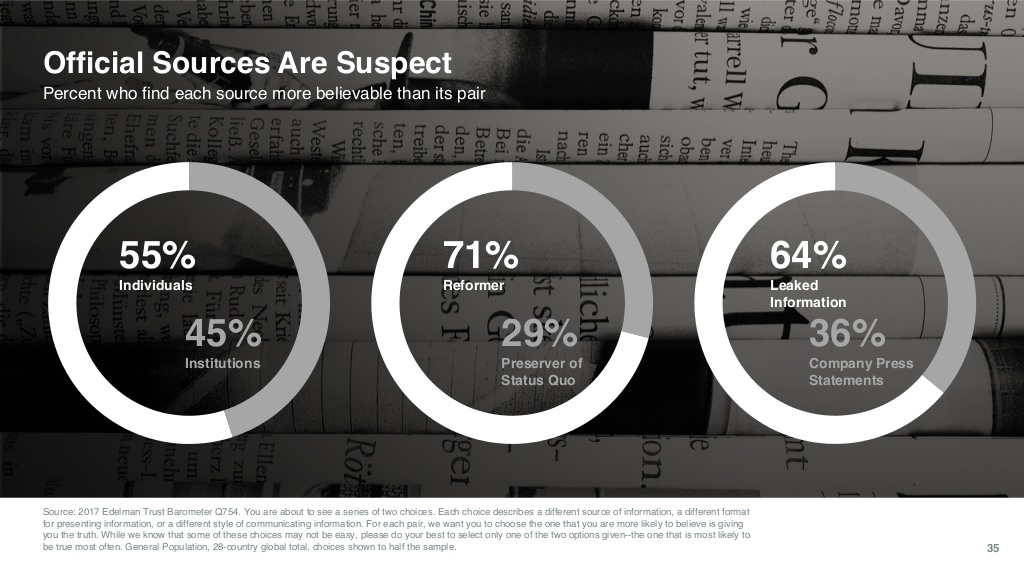
CEOs are no longer your best spokesperson
In Australia, people surveyed criticised big businesses for not paying their fair share of taxes, which, understandably, has led to a deep distrust of leadership, with the global credibility of CEOs plunging to 37%, the lowest it’s been since the surveys began. For Australian “c-suite” managers, it’s even worse, scraping in at a dismal 26%.
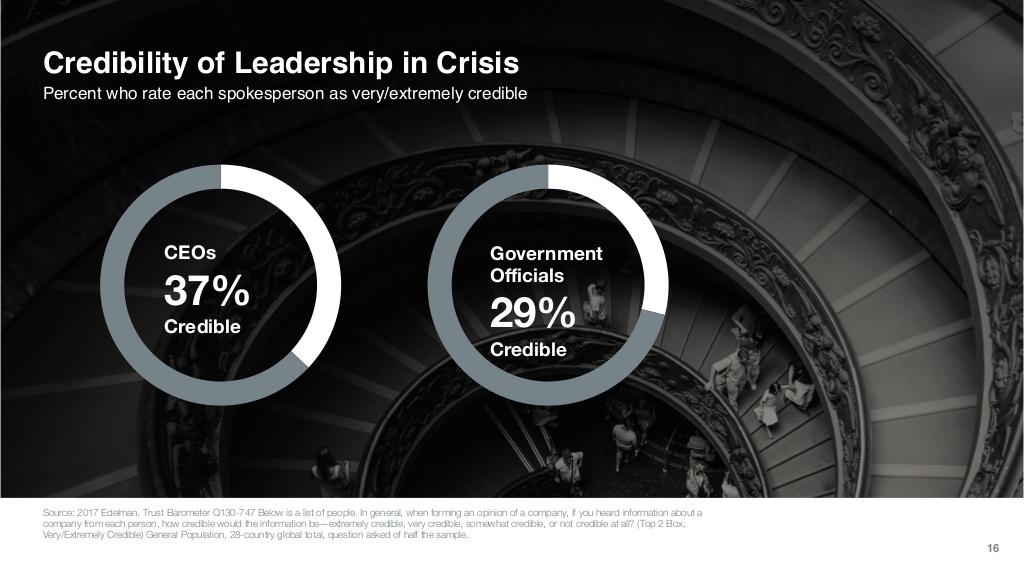
Love Local
Businesses have also contributed to the distrust by not actively and successfully addressing the fears of their own staff. The fear of losing ones job through lack of training, cheaper markets, globalisation, automation and foreign competitors is a shared global fear for most surveyed.
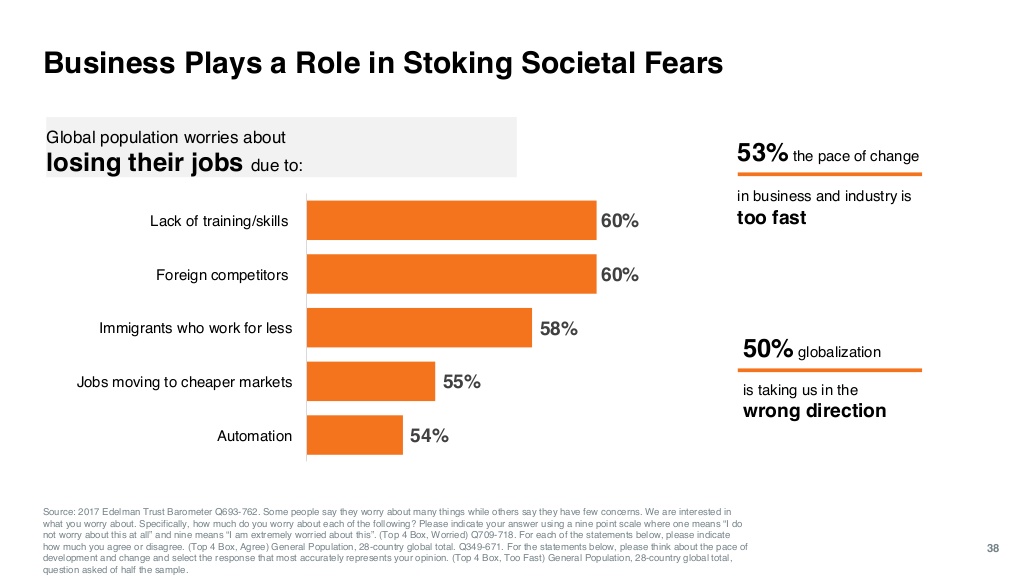
Whether consciously or subconsciously, their own fear will drive them to make purchases and partner with smaller local businesses. Now, more than ever, consumers may prefer to make purchasing decisions at locally owned, smaller alternatives. So if your business is locally owned and operated, this could now be a huge selling point rather than a detraction. Start promoting this aspect of your business.
PLAY FAIR
How you treat your staff, whether you give back to your community, how you advertise and promote your brand (not just the marketing itself), and more importantly who speaks on your behalf – all this will be taken into account, more stringently than ever.
According to the report, the top 5 ways a company can nurture trust is to: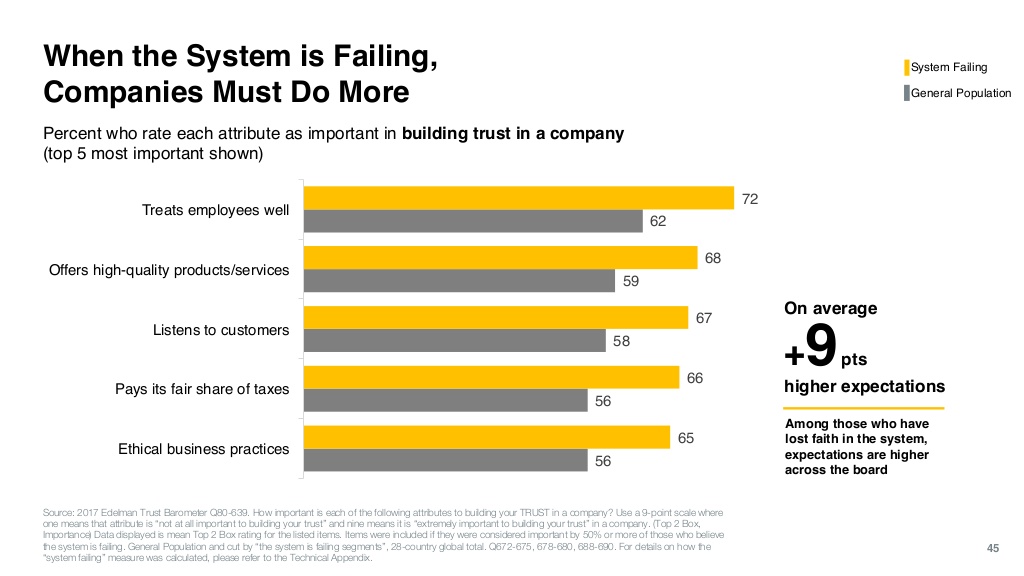
Page 45 of Edelman Trust Barometer 2017
- Treat employees well & fairly
- Offer high-quality products/ services
- Listen to customers
- Pay its fair share of taxes
- Practice ethical business practices
I’d say these are all common sense and fair requests!
And again, how you speak to your customers is going to be important.
Dialogue, not monologue
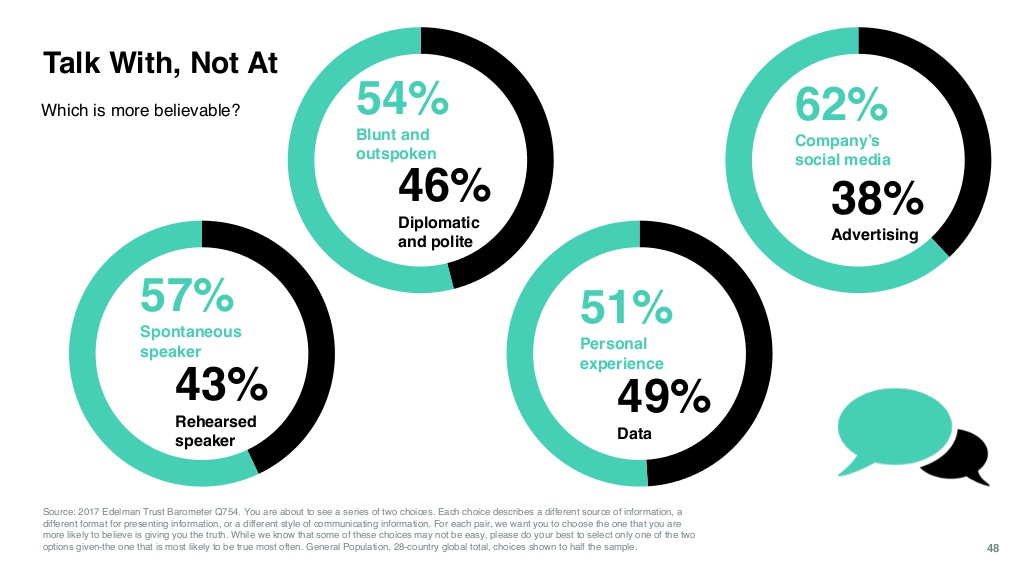
It’s important for businesses to note that 62% prefer social media rather than advertising, due to its ability to allow engagement in dialogue. The tone of voice, personal experience with the company and personality are also important.
And who speaks for your company?
Employees are more trusted than Senior Execs

Your employees are seen as the most trusted representative on core topics. So if you’re thinking of social media, blogging, articles, showcases or events, your staff is now MVP. Let them in the game!
Search Engines grow as media overall drops
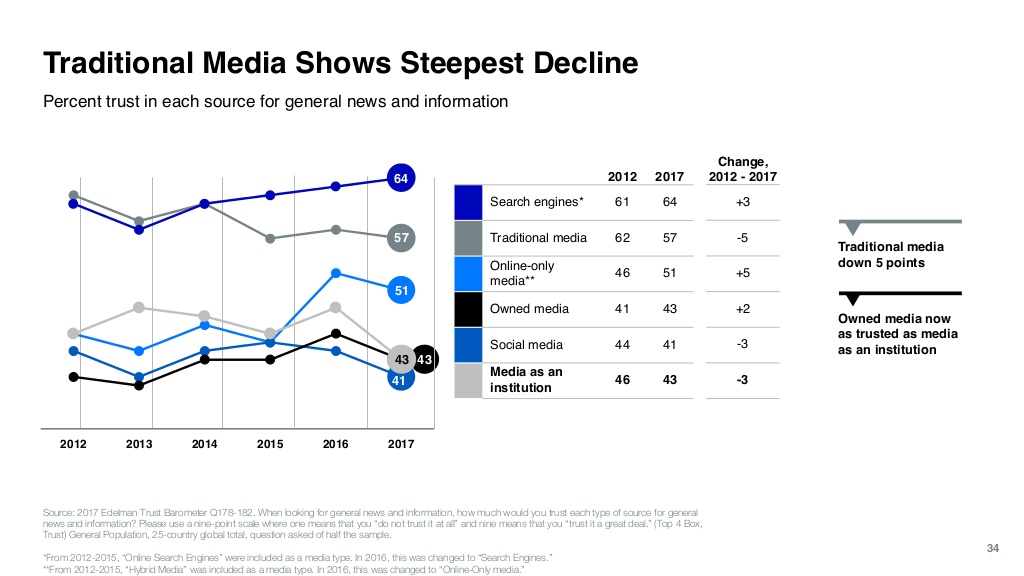
Coupled with this distrust of business, is the massive drop in trust for traditional media. Despite an increase of 5 points from 2012 to 2017 for Online-only media, it suffered a Y0Y drop, too. Trust in all media (traditional, online-only, owned, social and media as an institution) actually dropped since 2016.
Although trust in all media has declined YoY, there is a positive growth of trust with Search Engines since 2013, increasing YoY. This means your search ranking is going to be more important, and with that will come the need for things like good content to boost your SEO.
In line with this is the consideration is that an echo chamber is in action.
Echo Chambers stifle communications to new leads
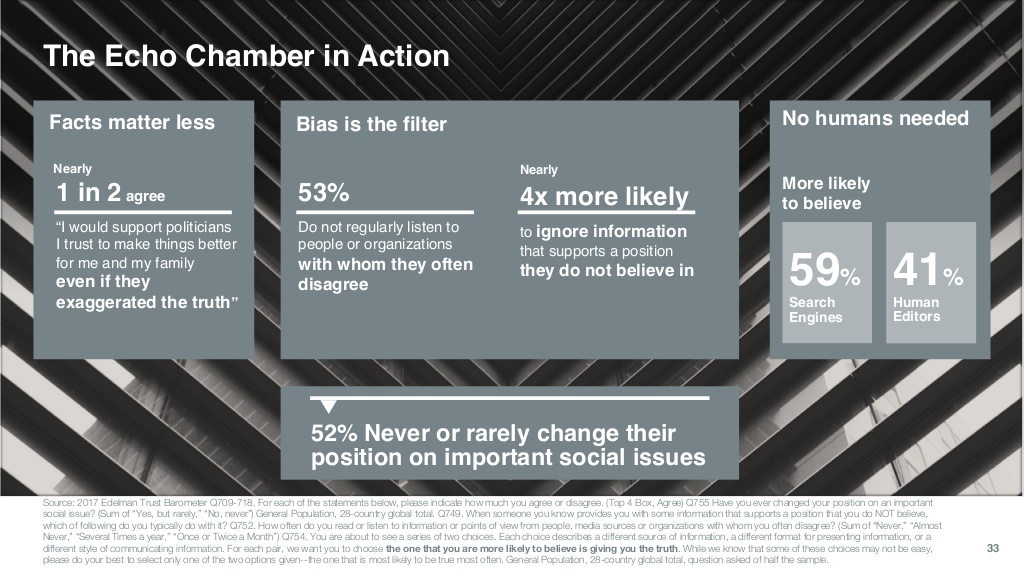
For businesses, it means that you cannot use the same methods to reach NEW consumers as you did in the past. If they don’t know or like you now, chances are, they won’t find out about you or change their mind if you keep your messaging only on the same platforms in the same ways. So if you want NEW leads, you might have to look outside your current marketing comms strategy.
It’s worth noting that search engines pop up again as a source more likely to be believed, with 59% of responders choosing it as “more likely to believe is giving you the truth” over human editors.
What can you do about it?
So in light of this distrust, apart from silently screaming, what can businesses do to navigate this environment of distrust and scepticism? A lot.
This trend of distrust of business and media has been happening for a while. So the good news is that smart marketers, entrepreneurs and businesses have already veered away from relying too heavily on typical marketing activities.
Instead, they’ve focused on promoting their honest customer reviews across partner platforms, as well as on their own. This spreads their marketing content outside of their own eco-system.
They’re partnering with like-minded businesses with shared values and shared consumers for relevant content, cross-promotions and campaigns. Other activities include investing in social good and adopting a public social dialogue with customers, driven by empowered staff.
There’s already a healthy baseline of change that’s occurred prior to this report that smart businesses can learn from. And if you’re just starting your own business, you’re in an even better position to establish that baseline from the beginning.
New Normal For Business – small is good and ethical is strong
The new opportunity that comes with consumers becoming more sceptical of big businesses, globalisation and traditional media, is that smaller ethical businesses can now actually compete on a more of a level footing, and may actually gain the upper hand. And this is where key changes can be made by small nimble companies to improve not only their business but the community as a whole.
Smaller, locally-based, Australian-owned companies with equal or better quality products and services can now be seen as a positive value proposition to consumers. Whereas in the past, the smaller size and localisation may have been a detriment when competing with the big boys, it’s now a valued selling point.
All else being equal with a service or product, a healthy localised business with elements of social good now has a fighting chance of competing with a larger, global alternative.
For businesses which have these values (local, social good, people-focused) and already operate ethically, promoting their position will be an important distinction for their marketing. One which can help them win disillusioned consumers from larger competitors.
And smaller businesses may be nimble enough to adopt or strengthen these values, fast.
The data shows that businesses need to change the way they communicate both to their staff, and to the public.
So whatever your size, more than ever, this means how and why you do business is vital to your success.
5 ways to improve
In light of these results, here are a few ways you can review and improve your marketing practices:
1. Customer reviews
Dial down the advertising and amp up your testimonials & case studies. Start asking for feedback or create a process where feedback can be easily given. How can you share stories of how you’ve helped your clients?
2. Let staff speak
They’re your strongest advocates or your most dangerous detractors. Empower them to speak. They will be the first to tell you what’s going right or wrong. Would they recommend your product/ service to their friends and family? Why or why not? Ask, listen and act. Let them represent the company and brand at events, social media and online.
3. Chat WITH your customers
Start a dialogue. Get on social media and ask them what they do/ don’t want. Be prepared for feedback, both good and bad. Say sorry. Be transparent, even if you’re wrong. Honesty is priceless.
4. Speak up & Give back
Be vocal about your values and how you’re supporting your staff and/or the local community. In an age of fear, it is refreshing (and much needed) to hear values of positivity and kindness. Celebrate birthdays, engagements, graduations. Small things do matter.
5. Evolve your marketing
It’s not all advertising. What content can you write to get better search results? Get out of your echo chamber. Could you partner with an influencer, a community group or another local business to reach a different and still relevant audience? Can your staff have more of a voice on social media, blogs and website? Where else can you share your customer reviews and case studies? The power of word-of-mouth is something I’ve nurtured in all the companies I’ve worked at, how can you foster yours?
I love doing business with good people and I love running a business with ethics and integrity. Trust is key in that relationship. Because od this, an ethical business naturally lends itself to long-term partnerships and success.
So if there’s a positive to come out of this report, it is that ethical businesses are already well-prepared for this age of the ultra-sceptical consumer.
Doing right has never felt so good.
Steve Spurr, CEO of Edelman, was quoted in Mumbrella and B&T about the results of the survey: “An overwhelming 63 percent of Australians want businesses to pay their fair share of taxes, they want them to have ethical business practices and to treat their employees well. It’s time for companies to do more. Business leaders must stand up for issues that matter to society.”
And this is where all businesses, big and small, will need to listen and act.
For more ideas on how you can do more to adapt as an intelligent business, let’s chat.[/vc_column_text][/vc_column][/vc_row]

